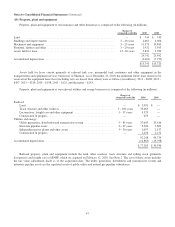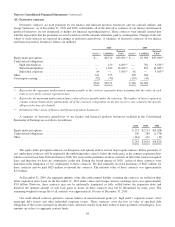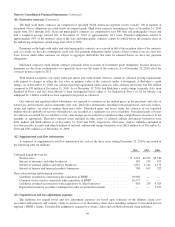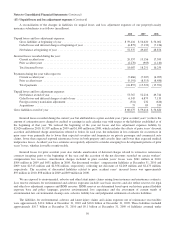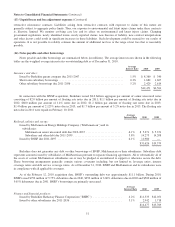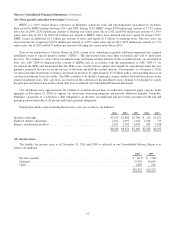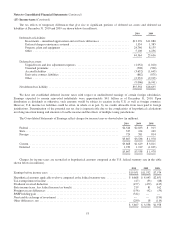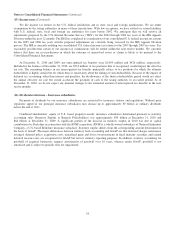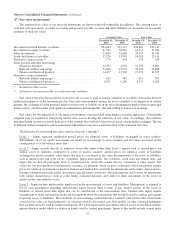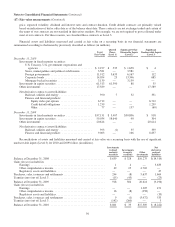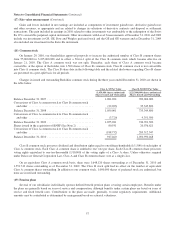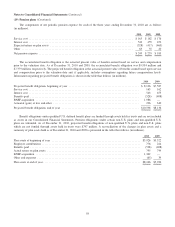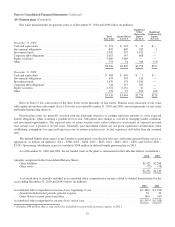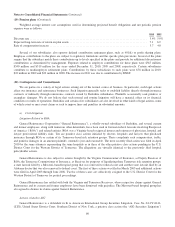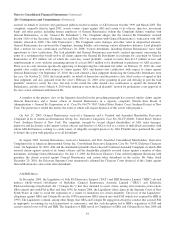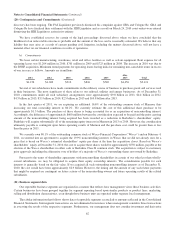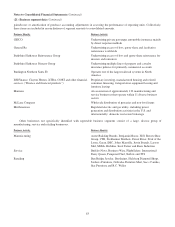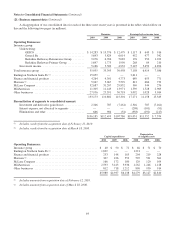Berkshire Hathaway 2010 Annual Report Download - page 56
Download and view the complete annual report
Please find page 56 of the 2010 Berkshire Hathaway annual report below. You can navigate through the pages in the report by either clicking on the pages listed below, or by using the keyword search tool below to find specific information within the annual report.Notes to Consolidated Financial Statements (Continued)
(15) Income taxes (Continued)
We file income tax returns in the U.S. federal jurisdiction and in state, local and foreign jurisdictions. We are under
examination by the taxing authorities in many of these jurisdictions. With few exceptions, we have settled tax return liabilities
with U.S. federal, state, local and foreign tax authorities for years before 2002. We anticipate that we will resolve all
adjustments proposed by the U.S. Internal Revenue Service (“IRS”) for the 2002 through 2004 tax years at the IRS Appeals
Division within the next 12 months. The IRS has completed its examination of our consolidated U.S. federal income tax returns
for the 2005 and 2006 tax years and the proposed adjustments are currently being reviewed by the IRS Appeals Division
process. The IRS is currently auditing our consolidated U.S. federal income tax returns for the 2007 through 2009 tax years. It is
reasonably possible that certain of our income tax examinations will be settled within the next twelve months. We currently
believe that there are no jurisdictions in which the outcome of unresolved issues or claims is likely to be material to the
Consolidated Financial Statements.
At December 31, 2010 and 2009, net unrecognized tax benefits were $1,005 million and $926 million, respectively.
Included in the balance at December 31, 2010, are $774 million of tax positions that, if recognized, would impact the effective
tax rate. The remaining balance in net unrecognized tax benefits principally relates to tax positions for which the ultimate
deductibility is highly certain but for which there is uncertainty about the timing of such deductibility. Because of the impact of
deferred tax accounting, other than interest and penalties, the disallowance of the shorter deductibility period would not affect
the annual effective tax rate but would accelerate the payment of cash to the taxing authority to an earlier period. As of
December 31, 2010, we do not expect any material changes to the estimated amount of unrecognized tax benefits in the next
twelve months.
(16) Dividend restrictions – Insurance subsidiaries
Payments of dividends by our insurance subsidiaries are restricted by insurance statutes and regulations. Without prior
regulatory approval, our principal insurance subsidiaries may declare up to approximately $9 billion as ordinary dividends
before the end of 2011.
Combined shareholders’ equity of U.S. based property/casualty insurance subsidiaries determined pursuant to statutory
accounting rules (Statutory Surplus as Regards Policyholders) was approximately $94 billion at December 31, 2010 and
$64 billion at December 31, 2009. A significant portion of the increase in statutory surplus in 2010 was due to capital
contributions by Berkshire in connection with the BNSF acquisition. BNSF is a wholly-owned subsidiary of National Indemnity
Company, a U.S. based Berkshire insurance subsidiary. Statutory surplus differs from the corresponding amount determined on
the basis of GAAP. The major differences between statutory basis accounting and GAAP are that deferred charges reinsurance
assumed, deferred policy acquisition costs, unrealized gains and losses on investments in fixed maturity securities and related
deferred income taxes are recognized for GAAP but not for statutory reporting purposes. In addition, statutory accounting for
goodwill of acquired businesses requires amortization of goodwill over 10 years, whereas under GAAP, goodwill is not
amortized and is subject to periodic tests for impairment.
54





